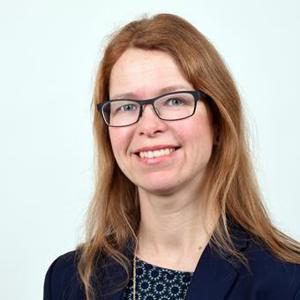“If everyone reduced their consumption by as little as 10%, political panic would ensue”, Ken Webster claimed.
Ken Webster Photo credit Magnus Johansson“Our societies are based on continuous growth, with GNP as the measure of success. They require a linear economy that must consume new resources to fuel production and consumption. This cannot continue. We must rethink, not only on the level of individuals but also, and more importantly, on the level of systems”, Ken Webster said.
He is responsible for innovations at the Ellen MacArthur Foundation and is visiting Linköping University for a year to teach, meet students and researchers, and engage politicians and companies in dialogue. Ken Webster is the person who has coined the concept of the “circular economy” and brought it into general use.
Ken Webster uses an image of a flock of starlings in flight in the sky, unceasingly changing its collective motion while at the same time remaining in interaction to demonstrate that we can create other structures. In particular, we can convert the currently prevalent economic world order to a circular economy. This means that products are not destined in time to be discarded as waste, but right from the start are designed and manufactured to become raw materials for new products.
But people are creatures of habit and we have learned for a very long time to throw things away and buy new ones. One of the greatest impediments to a radically different economic system is quite simply our way of thinking.
“We must realise that the game must be played by new rules”, he says.
Conversion to a circular economy requires, firstly, a new philosophy. What are the roles, for example, that money and capital will play? Do we need so many possessions – and if so, why? Because I earned it? The conversion also requires, secondly, action, while we must ensure that the actions we need to take are possible.
It’s not simple to change systems.
“People want to know what it will be like – and they want a simple ‘Yes’ or ‘No’ answer. I usually answer ‘Maybe’”, says Ken Webster.
It is not possible to predict the results of changes, such as a transition to a circular economy.
“We must accept this. And there are tipping points: everything heads off in a different direction than we had planned, and this can happen quickly.”
A striking example comes from a photograph taken in Manhattan at the turn of the previous century with the transport method then in use – horses and carriages.
“One year later it looked like this”, he says and shows the next photograph: dominated by cars.
The LiU-researchers Maria Björklund, associate professor and Björn-Ola Linnér, professor. Photo credit Magnus JohanssonAfter Ken Webster’s lecture, two LiU researchers, Björn-Ola Linnér and Maria Björklund, and Mattias Josephson, Epishine, took part in a panel discussion.
The final point of the programme came from LiU student Chahrazed Guez Guez, who described how she had developed the “Look For My” web-based service. This is a smart way to find lost items – or to get an idea of what to do with things you’ve found.
“The public transport service in Stockholm, for example, collects 300,000 lost items every six months”, said Chahrazed Guez Guez and gave the audience something to think about before they rose from the terraced seating and the great curtain was drawn back to open the other part of the ground floor of Studenthuset.
The seminar was chaired by Karin Ackerholm, LiU innovation.
A further three seminars on the topic of sustainability will be held during the festival week, Monday to Wednesday. Same time, 10.00–12.00 am, same place.

